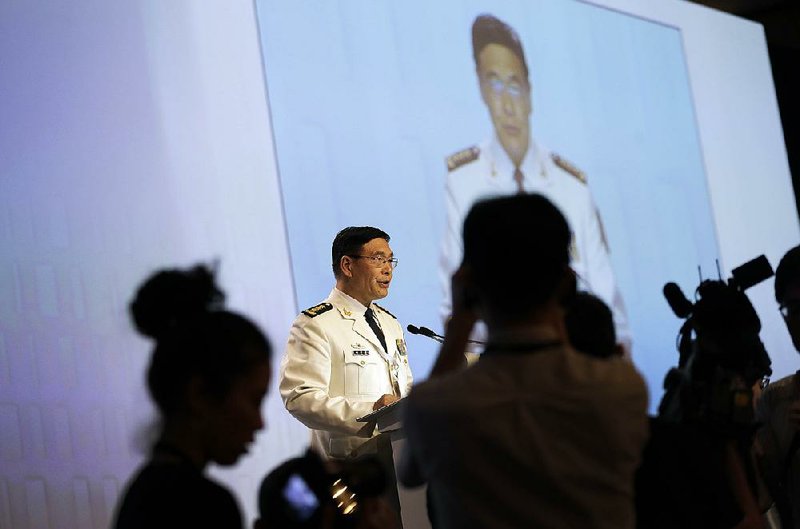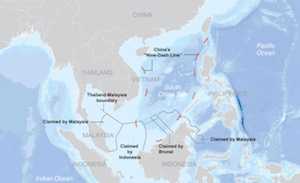SINGAPORE -- Chinese Adm. Sun Jianguo used a speech to global defense chiefs to tout his military's cooperation in the western Pacific, while taking aim at the U.S. for sailing ships near reefs that China claims in the disputed South China Sea.
Sun's address on Sunday struck a more conciliatory tone at the Shangri-La security dialogue in Singapore than last year, even as China beefs up its military presence in contested areas. He stressed the People's Liberation Army's interactions with the militaries of Southeast Asia and countries like India and Japan.
"The Asia-Pacific countries have constituted a community of shared destiny, interdependent and inseparable," Sun said. "The bright future for the Asia-Pacific region has to be facilitated by common development and common security of all regional countries."
China claims more than 80 percent of the South China Sea as sovereign territory. It has reclaimed more than 3,000 acres in the area in the past few years and built some military infrastructure on the man-made islets. Its claims are contested by Vietnam, the Philippines and other countries, and the sea is a conduit for more than $5 trillion in trade every year.
"China advocates a new security outlook, featuring inclusive, shared and win-win security cooperation by all," said Sun. "From the defense and military perspective, China believes that countries in the Asia-Pacific region should work together to promote security governance."
While Sun said China was committed to peace and security, he said China would not accept a ruling at The Hague on the South China Sea that is expected within weeks. The arbitration court is considering a Philippine challenge to China's territorial claims.
In the lead-up to the ruling, China has mounted a public relations blitz in the media to promote its position on the waterway. China's diplomats have been busily visiting Southeast Asian capitals.
Sun said China's door was open to Philippine President-elect Rodrigo Duterte to resume bilateral talks on their territorial dispute.
"China isn't out to stir trouble, but neither is China scared of trouble," Sun said. "China will not stand for its sovereign rights to be trampled on.
"The South China Sea's freedom of navigation hasn't been impeded because of the territorial disputes," Sun said. "If freedom of navigation is compromised in the South China Sea then China is the largest victim. If freedom of navigation is undermined then China would not be to blame."
Sun also said China's military was working well with counterparts in the U.S., and cited an agreement between the two to manage unplanned encounters at sea. At the same time, he implicitly rebuked the U.S. for conducting freedom of navigation operations in the South China Sea, where the U.S. has sailed near reefs that China says belong to it.
"One country takes a speculative attitude, following principles in line with its interests and leaving principles that don't fit its interest," he said. "It took the lead to promote a so-called scheme of freedom of navigation, showing off its military power publicly."
Sun also rebutted U.S. Defense Secretary Ashton Carter's comment Saturday that China risked building a "Great Wall of self-isolation" through its actions on the South China Sea, saying he had had positive interactions at Shangri-La with defense ministers and chiefs.
"Most of them are warmer and more friendly to me than last year, and they respect me and trust me more than last year," he said. "We have not received so many questions about the South China Sea as last year."
"In fact China is open, inclusive and a responsible country, it is a participator and constructor and contributor to the current international system," Sun said. "We are not isolated and we will not be isolated in the future."
Also speaking at the forum Sunday, Vietnam's Deputy Defense Minister Chi Vinh Nguyen said major powers all bear a responsibility to maintain peace in the area.
"The situation has recently developed in a worrying trend," Vinh said. "There have been activities of unilateralism and coercion.
"This development, if not addressed properly, will lead to arms races, rivalry and disastrous consequences."
U.S. Secretary of State John Kerry said Sunday that China would be committing a provocative and destabilizing act if it establishes an air defense zone in the South China Sea.
Such action would raise tension between China and its Asian neighbors, he said, and also would call into question China's commitment to resolving disputes over islands and maritime claims diplomatically.
In a question-and-answer session while he was visiting Mongolia, Kerry said the U.S. doesn't take sides on competing claims. He said no country should move unilaterally to militarize the resource-rich region.
Kerry traveled on to China later Sunday for annual U.S.-China strategic and economic talks.
EU presence urged
A French official said Sunday that the country will urge European Union nations to coordinate navy patrols to ensure a "regular and visible" presence in the disputed South China Sea, in the latest sign of international push-back to China's expanded military presence in the area.
The French government views the protection of freedom of the seas as critical from an economic standpoint and is concerned that a loss of such rights in the South China Sea may lead to similar problems in the Arctic Ocean or Mediterranean Sea, Defense Minister Jean-Yves Le Drian told attendees at the Shangri-La conference.
"If we want to contain the risk of conflict, we must defend this right, and defend it ourselves," Le Drian said.
He said that so far this year, France's navy has been deployed three times through parts of the South China Sea.
"Several times per year, French navy ships cross the waters of this region, and they'll continue to do it," he said.
European nations have previously urged claimant states in the South China Sea -- China, Taiwan and some Southeast Asian nations -- to resolve their disputes peacefully, while calling for the continuation of free navigation through one of the world's busiest shipping lanes.
Still, there has not so far been a major upswing in the military presence from Europe.
"This is a message that France will continue to be present at international forums," Le Drian said. "It's also a message that France will continue to act upon, by sailing its ships and flying its planes wherever international law will allow, and wherever operational needs request that we do so."
Le Drian said he regretted that the Association of Southeast Asian Nations had not made substantial progress toward a code of conduct with China on the South China Sea.
A senior French official who traveled with the minister said the country will discuss plans with EU partners in coming weeks, with a focus on guaranteeing that EU navies regularly crisscross the waters.
With countries such as the United Kingdom and Netherlands sending ships to the area from time to time, France is interested in better coordinating patrols to ensure there is no long gap without an EU presence in the area, according to the official, who asked not to be identified, citing policy.
Another possibility, the official said, is smaller EU navies or those currently less engaged in the area sending ships that would be integrated in French task forces to minimize supply difficulties.
Information for this article was contributed by Jason Koutsoukis, Andrea Tan, Rosalind Mathieson, Alfred Cang, David Roman and David Tweed of Bloomberg News; and by Bradley Klapper of The Associated Press.
A Section on 06/06/2016

